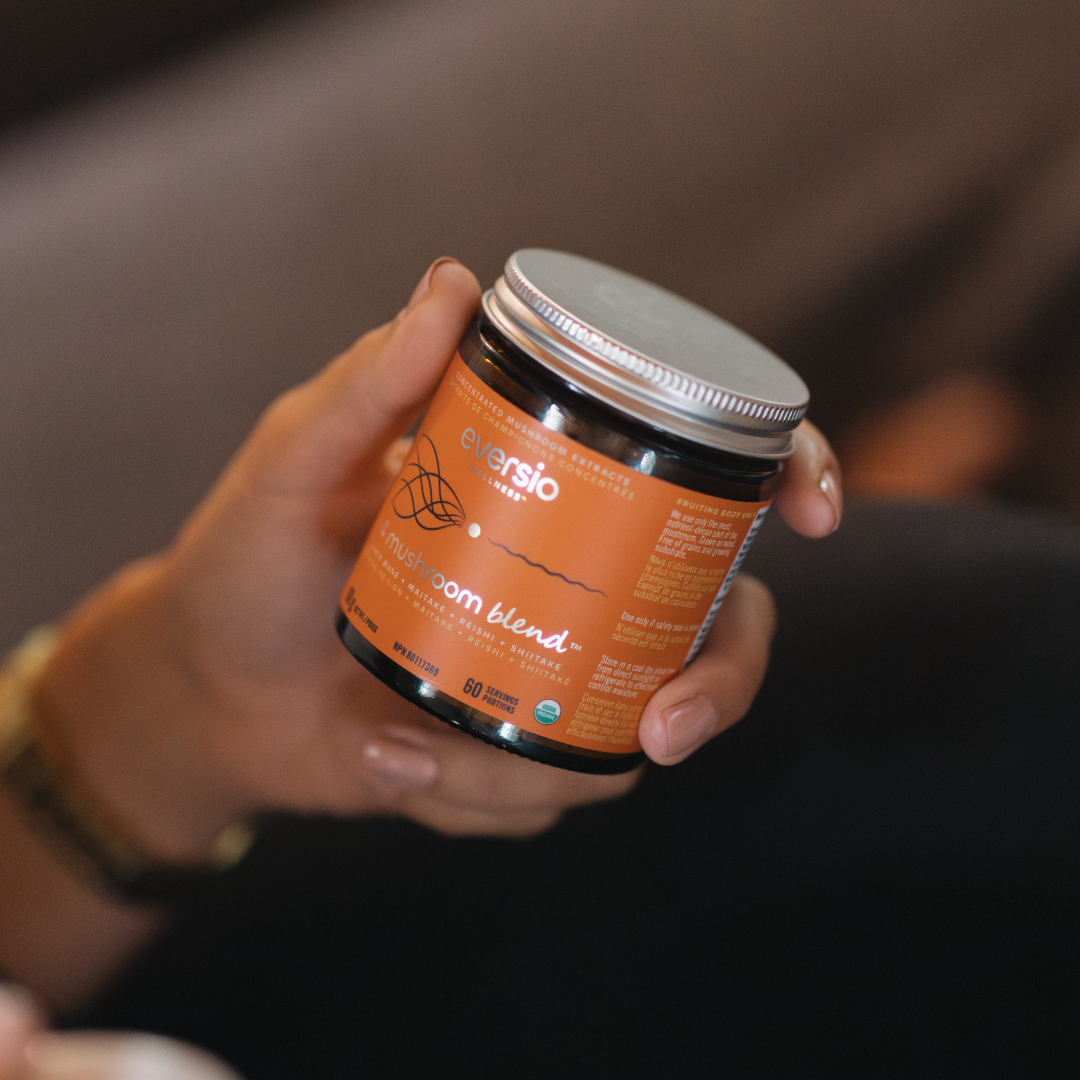February 1, 2024 | Dr. Silvana Jakupovic, ND
Alzheimer's disease, a neurodegenerative disorder, casts a long shadow over countless lives and families worldwide. It's a condition that not only challenges our understanding of brain health but also beckons a deeper exploration of potential remedies, both conventional and alternative. Among these, functional mushrooms emerge as a beacon of hope, offering a fusion of ancient wisdom and modern science.
June, recognized as Alzheimer's & Brain Awareness Month, presents a prime opportunity to spotlight this issue. This month is dedicated to increasing awareness about Alzheimer's and other brain diseases, encouraging support for research, and fostering education on brain health. It's a time when communities unite in a collective effort to shed light on these conditions, share stories, and promote advancements in treatment and prevention.
Overview of Neurodegenerative Conditions
Alzheimer's disease stands as a prominent representative of a wider spectrum of brain diseases that afflict millions globally. This spectrum encompasses various forms of dementia, Parkinson's disease, and other neurodegenerative conditions, each characterized by a progressive decline in cognitive and neurological functions.
Alzheimer's, the most common form of dementia, manifests in memory loss, impaired judgment, and a gradual erosion of the individual's ability to perform daily activities. Similarly, Parkinson's disease is marked by motor symptoms like tremors and rigidity, coupled with cognitive impairments.
These diseases share a common thread – the gradual loss of neurons and the brain's ability to process and store information. The complexity of these diseases, including their causes, which range from genetic factors to environmental influences, makes them a significant challenge in the medical field. Alzheimer's & Brain Awareness Month serves as a crucial platform to highlight the urgency of addressing these conditions, fostering a broader understanding, and spurring support for research and care strategies.
Functional Mushrooms – An Introduction
Functional mushrooms are not your ordinary culinary varieties; they are special species like Lion's Mane, Reishi, and Tremella, each with unique functional properties. These mushrooms contain bioactive compounds that are believed to support brain health, including antioxidants, beta-glucans, and other polysaccharides. Their purported benefits range from promoting neurogenesis (growth of new neurons) to offering protective effects against neurodegenerative diseases.
Key Active Compounds: Beta-glucans, Nootropics, Antioxidants
Nootropic effects are one of the key aspects of functional mushrooms. Nootropics are substances that enhance cognitive health and function, including memory, focus, and mental clarity. Several functional mushrooms have demonstrated significant potential as nootropic agents.
Apart from their nootropic effects, functional mushrooms are rich in other bioactive compounds that can benefit brain health. These mushrooms are known for their high content of beta-glucans, which have immune-modulating and anti-inflammatory properties. The presence of antioxidants in functional mushrooms, such as Reishi, can help combat oxidative stress and protect the brain from damage caused by free radicals. Additionally, the immune-stimulating properties of functional mushrooms can support overall health and potentially contribute to better cognitive function.
Lion's Mane: The Brain Booster
Lion's Mane mushroom has gained considerable attention for its potential to support brain health and cognitive function, making it a promising candidate for dementia care. One of the key factors contributing to its therapeutic effects is its ability to promote the production of nerve growth factor (NGF), a protein vital for the growth, maintenance, and survival of neurons in the brain [1,2]. NGF plays a crucial role in neuroplasticity, the brain's ability to adapt and form new connections, which is particularly important for learning and memory.
Several studies have explored the neuroprotective properties of Lion's Mane mushroom and its potential benefits in dementia-related conditions. Research has suggested that Lion's Mane extract can help prevent or reduce the accumulation of beta-amyloid plaques and tau protein tangles, which are characteristic hallmarks of Alzheimer's disease [3]. By inhibiting the formation of these abnormal protein aggregates, Lion's Mane may potentially slow down the progression of neurodegenerative diseases.
Furthermore, the Lion's Mane mushroom has demonstrated the ability to enhance cognitive function and memory. In a study involving older adults with mild cognitive impairment, participants who consumed Lion's Mane extract over several months showed improvements in cognitive function compared to those who received a placebo [4]. These findings suggest that Lion's Mane may have a positive impact on memory and cognitive abilities, which are often compromised in individuals with Alzheimer's and dementia.
Reishi: The Mind Calmer
One of the key attributes of Reishi mushroom is its anti-inflammatory properties, which can have significant implications for brain health. Chronic inflammation is believed to play a role in the progression of neurodegenerative diseases, including Alzheimer's and dementia. By reducing inflammation, Reishi may help mitigate damage to brain cells and support overall cognitive function.
Reishi is also recognized for its potent antioxidant activity. Oxidative stress, caused by an imbalance between free radicals and antioxidants in the body, is known to contribute to the development and progression of neurodegenerative disorders [5]. Reishi's high content of antioxidants helps neutralize free radicals, protecting brain cells from oxidative damage and promoting healthy brain function [6].
Another notable benefit of Reishi is its ability to boost the immune system. The immune system plays a critical role in maintaining brain health, as chronic inflammation and immune dysfunction can have detrimental effects on cognitive function [7]. Reishi's immune-modulating properties can help regulate the immune response and potentially reduce inflammation in the brain.
Tremella: The Beauty Mushroom with Brain Benefits
One key aspect of Tremella mushroom's potential in dementia care lies in its ability to enhance cognitive performance. Studies have shown that Tremella supplementation can improve memory and learning abilities, making it a promising natural intervention for individuals with cognitive impairments [8]. The precise mechanisms underlying these effects are still being explored but may involve Tremella's impact on neuroplasticity and the promotion of neuronal growth and survival.
In one study, Tremella mushroom extracts were found to result in behavioural and structural changes in the treatment group when compared to the placebo [9]. Not only did Tremella show significant improvement in learning and memory, but it also alleviated the loss of ChAT in the hippocampus of the brain, which is an important indicator of the functional state of certain neurons in the central and peripheral nervous systems [9,10]. Higher levels of ChAT in the hippocampal region of the brain have been associated with better performance on certain learning and memory tasks [11].
Much like Reishi, Tremella has anti-inflammatory and antioxidant properties that are of particular interest in the context of dementia. As mentioned, oxidative stress leads to the accumulation of free radicals, causing damage to brain cells. Tremella's antioxidant compounds can neutralize these harmful free radicals, potentially preserving cognitive function and reducing the risk of dementia-related conditions.
Integrating Functional Mushrooms into Alzheimer's and Dementia Care
Integrating these mushrooms into holistic treatment approaches may offer a multifaceted approach to managing cognitive decline and supporting brain health. While functional mushrooms should not replace conventional medical treatments, their unique bioactive compounds, such as nerve growth factor stimulation, anti-inflammatory effects, and antioxidant properties, can complement existing therapies by addressing various aspects of neurodegenerative diseases.
Consulting with healthcare professionals experienced in herbal medicine and exploring appropriate supplementation options can help individuals and caregivers make informed decisions regarding the incorporation of functional mushrooms into their Alzheimer's and dementia care plans.
Prevention is Key
When it comes to Alzheimer's and dementia, prevention plays a crucial role in maintaining brain health. While these mushrooms can offer supportive benefits in dementia care, their greatest impact may lie in their preventive properties. By incorporating functional mushrooms into a proactive approach to brain health, individuals may reduce their risk of developing neurodegenerative diseases later in life.
It is important to note that the best outcomes are achieved when functional mushrooms are used as part of a comprehensive approach to brain health. This approach includes regular physical exercise, a nutrient-rich diet, mental stimulation, adequate sleep, and the management of other lifestyle factors that influence cognitive well-being [12]. Consulting with healthcare professionals knowledgeable in both conventional and complementary medicine can provide personalized guidance on the appropriate use of functional mushrooms for prevention based on an individual's specific needs and health profile.























Leave a comment
All comments are moderated before being published.
This site is protected by hCaptcha and the hCaptcha Privacy Policy and Terms of Service apply.